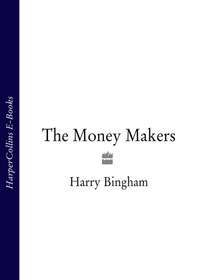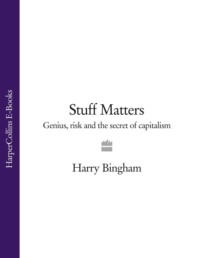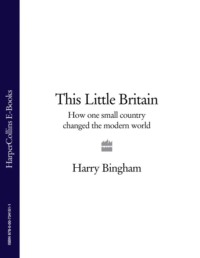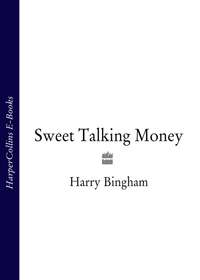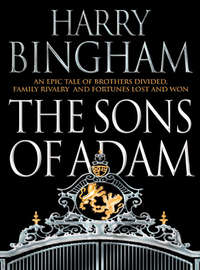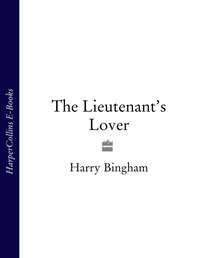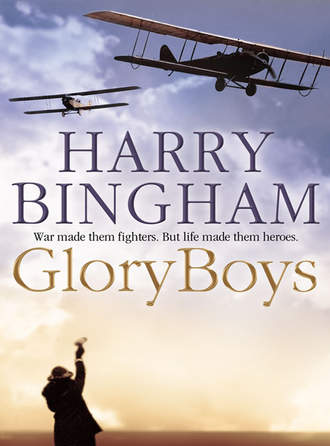
Полная версия
Glory Boys
‘Jesus Christ!’ said Powell.
‘Pretty good stunt, isn’t it?’
‘Looks like you just fell clean off the edge.’
‘We did just fall.’
‘Something wrong with the airplane?’
‘No. It’s a question of air speed. You have to build speed before you can climb. And it was a dive, not a fall. Saying “fall” makes it sound bad.’
‘I saw a picture recently where they pulled a stunt like that.’
‘Breaking Free. They had it in Breaking Free.’
‘Yeah, maybe. Only there, the airplane flew, it didn’t just fall. You sure your plane was OK?’
‘They had a catapult. We thought about using a catapult, only it wouldn’t have been very realistic.’
‘Realistic…?’
The two men watched in silence to the end of the reel. They watched the girl be captured twice more by the hoodlums and be rescued back both times. The best stunt showed the girl being snatched by an airplane from a speeding car. The girl didn’t look too much like O’Hara and the pilot didn’t look too much like Willard, but it was a good stunt all the same.
The second reel snickered to its close. Willard got up again, tweaking the cuffs of his shirt from his jacket sleeve so they showed up better. He’d just spent four hundred bucks on a set of silver cuff-links and it annoyed him when they didn’t show. Powell stood up to flex his back. The cigar smoke filled the room like a migraine.
‘How’s distribution coming along? If I was going to be picky about it, I’d have to remind you that your first repayments were due last week.’
‘Distribution?’ said Willard. ‘Don’t you even want the third reel?’
‘Oh, there’s more? Sure…’
The reel ran on in ugly silence. Willard watched it with new eyes and found himself hating every frame of it. A picture of class, indeed! The picture was pitiful, truly pitiful.
He owed Ted Powell one hundred and ninety-four thousand bucks.
7
There was plenty to do.
The first thing was to cut away the ruined fabric and assess damage to the wooden structure beneath. Using knives sharpened in a little engine oil on the step of the barn, Abe and Brad cut away the torn cotton and piled it up in the yard to burn later.
As the ship’s frame began to come into view, Abe was relieved to see that the main wing-struts were scuffed and cracked, but basically intact. The plane looked more like a skeleton now; but there was something fast and hungry in her look as well. He whittled splints for the cracked spars and screwed them carefully into place, wrapping twine round the joins for extra strength.
Then Abe stripped the engine, so he could clean, oil and reassemble it. As he’d known from the outset, it had been a faulty valve in the fuel-line which had created a blockage in the feed. It had been the work of five minutes to locate the problem and fix the valve. Most engine problems were like that. Little tiny niggles, which sometimes killed you, sometimes didn’t.
As the first week merged into the second, the new undercarriage began to take shape. Abe had some ideas on putting a cowling around the wheel base to reduce drag. By stretching cotton tightly over an arrangement of hoops and battens, he succeeded in putting his ideas into practice. Poor old Poll looked like she was wearing her winter stockings, but he promised her that she’d like them once she was airborne.
When the structural work was all done, he and Brad wound swathes of cotton around the exposed frame, pulling it tight so the fabric was hard and taut. Then they painted her: red and white, the colours Abe had used ever since his days as a barnstormer. Then, to protect the paint and fabric, they painted her again with cellulose dope, a kind of aviator’s varnish.
The battered airplane began to look herself again; perhaps better.
Abe usually worked alone – he usually did pretty much everything alone – but he liked working with the kid. The kid’s enthusiasm was uncanny. His aptitude too. Again and again Brad reminded Abe of himself at the same age. It was almost like working with a version of himself plucked from twenty years into the past.
As the days passed, Abe had counted another twenty-three bullet holes in the buildings around Independence. The glossy boomtown down the hill still seemed to be invisible. There was still no explanation of why Independence was the only town in America which still treated ex-army pilots as descended demi-gods. Abe kept his eyes open and his mouth shut.
On the evening of the tenth day, Abe was sitting alone in the hotel dining room, eating cold pie and potatoes. Then, just as he was finishing, Gibson Hennessey, the tall storekeeper, wandered in. The two men nodded a greeting.
‘Ed Houghton looking after you OK?’
Abe thought of the mountainous puddings he’d been subjected to – each one of them ‘in his honour’.
‘Yeah. Sometimes even better than that,’ he commented.
‘Ted’s right hospitable when he wants to be, especially in the pudding-making department.’ Humour flickered round the storekeeper’s mouth, before his voice changed again. ‘You won’t take this bad, I hope, but there’s a little whiskey to be had, if you were a whiskey-drinking man.’
‘From time to time.’
The storekeeper wandered over to the shelves where the glasses were kept. He helped himself to a couple and led the way upstairs, clearly knowing which room Abe had been given. At the door, he stood back politely and let Abe open up.
The room was the best in the hotel, but simple enough for all that. There was a deep and comfortable bed, a dressing table and chair, a wardrobe, and a small green armchair which emitted puffs of dust if anyone sat on it. There were a couple of oil lamps, grown smoky from needing their wicks trimming. A thin curtain moved sluggishly in front of the open window.
‘This OK for you?’ said Hennessey, looking around. ‘I got a better room over at my place if you want it, only I figured you’d be happier without a troop of little Hennesseys yelling and screaming the whole time.’
‘You figured right.’
‘I’d probably be happier, matter of fact.’
Abe pulled off his boots and stretched out on the bed. Not satisfied with his first attempt at getting comfortable, he pounded and pummelled his pillows into shape, before lying back with a sigh. Hennessey put the two glasses on the table and produced a pint-bottle wrapped in brown paper from his coat pocket. He poured the whiskey and handed Abe a glass.
‘Local moonshine. Been going long before Volstead, keep going a long time after. It’s always had quite a following in Independence.’
Abe sipped. The whiskey was good and he drank again. They’d been varnishing again today, and, though Abe liked the smell, it always made him dizzy. The whiskey helped.
‘Mind if I smoke?’ Hennessey produced a packet from his pocket and offered them to Abe. The pilot shook his head, but told Hennessey to go ahead. For a while, the two men were silent together, Hennessey smoking by the open window, Abe lying, eyes half-closed, on the bed. Eventually the storekeeper broke the silence.
‘Being a famous man and all, I guess you get a lot of attention? Even when you don’t announce your presence by putting your machine right down on Main Street.’
Nothing in Abe’s manner changed, except that beneath his lids, his eyes grew more alert.
‘Truthfully, Hennessey? I haven’t been received like this for five years.’
The storekeeper smiled. ‘No shortage of patriotism in Independence. That’s the trouble with this country, see. Short memories. People ought to remember more.’ He finished his cigarette and tossed the glowing butt in a wide arc out onto the dirt street outside. He watched it go.
‘That’s the trouble with America, huh?’ said Abe softly. ‘And what’s the matter with Independence?’
The tall storekeeper turned from the window. ‘What makes you think there’s anything wrong?’
Abe closed his eyes and rested the glass of whiskey on his chest. ‘Only everything I’ve seen since coming. That’s all.’
Hennessey nodded. Some of his pleasure in their little drama left his face. It was replaced by something sadder and older.
‘What’s wrong with Independence?’ he repeated. ‘Everything’s wrong. Everything bar the whiskey.’
8
‘Two hundred thousand dollars? Two hundred exactly?’
Junius Thornton, Willard’s father, named the figure. You need to be a rich man to name a sum like that and show no feeling aside from a businesslike care for arithmetical exactitude.
‘One ninety-four. I rounded up.’
‘One ninety-four, I see.’ The older man nodded. He had his son’s strong face and broad bones, but whereas Willard looked handsome, Junius just looked heavy. He looked the way a boxer might look, if he’d been hauled out of the ring and given five thousand dollars to spend at Brooks Brothers. ‘I had no idea pictures were so expensive.’
‘It’s not just the actors. You need the cameramen and the stunt guys. We used a lot of airplanes and … it adds up.’
‘Yes, I see. I’d never thought about it.’
There was a pause. Willard flicked at his trouser leg with irritation. Whoever had last pressed them had put the crease in the wrong place, so that the old one was still showing up like a shadow of the new. Willard wished he’d noticed before dressing that morning. The silence ran on.
‘Well, anyway,’ said Willard eventually, ‘Ted’s on at me about his money. I can’t help admitting I feel a little peeved. He’s not being quite gentlemanlike. I mean he can’t possibly think there’s a problem, can he?’
‘I don’t know,’ said his father. ‘I don’t know the nature of your arrangement.’
‘It was a loan, of course. But I mean to say, the understanding was always…’
‘Yes?’
‘Well, he never said anything about chivvying me, like some Lenox Avenue rent collector.’
‘But perhaps you never said anything about failing to repay him.’
‘Oh for heaven’s sake! Don’t take his side. It’s not like that.’
There was another pause, an even longer one this time. Sometimes, silences are shared. They belong equally to both people in the conversation. But not always. This one wasn’t. This one was strictly the property of the older man. Willard’s scalp tightened. Noises from the street outside seemed like an invasion. Eventually, the older man lifted his gaze.
‘You haven’t made it very plain why you wanted to see me. But, if I have it right, you are asking me to settle your debt with Ted.’
‘Yes. Yes, I am.’ Willard had been intending to ask for some money in addition. It had been a long time since he’d seen any income, and after selling his Hollywood villa and settling his other debts, he’d only have around twenty-five thousand dollars in the world. To ninety-five per cent of Americans, twenty-five thousand dollars would have felt like an impossibly large fortune. To Willard, it felt like the breadline.
‘You seem equally confident that I shall agree.’
‘And I should hope so! Lord, it’s not as though I’ve ever asked for money before.’
‘No. No, indeed.’
His father slid open a drawer and drew out a slim case in unmarked black leather. Inside, Willard knew, there was a chequebook issued by the Morgan Bank; America’s most prestigious bankers – and ones who offered their services only to the very, very wealthy. Junius picked up the fountain pen from his desk, uncapped it, examined the nib, dried it carefully on the pink blotter, then wrote out two cheques. He examined the nib again and frowned before screwing the cap back on the pen. He placed the chequebook back in the drawer and closed it.
All this time, Willard was silent and sulky. But if he’d been honest with himself, it hadn’t been too bad. His father had been difficult, but not nearly as bad as he might have been. He’d known some fellows back in college who’d had the most furious fights over money. All in all, he’d got off lightly. His headache drummed away, but wasn’t any worse.
His father took a dry sheet of blotting paper and held it down over the cheques, rubbing from side to side with a thick forefinger. He didn’t say why he’d written two. He didn’t say anything about how much he’d written the cheques for. They stayed invisible beneath the blotter.
‘Willard, in a way I’m pleased that we should be having this conversation.’
‘Yes, Father,’ his son responded, not quite clear what conversation it was they were having.
‘I am fifty-seven, as you know. I expect I shall have another thirteen years or so at the Firm. Perhaps less. I shan’t attempt to push myself if my health turns poor.’
‘No. Quite right. Worst thing to do. Did you ever meet poor old Noggy Edwards’ pa? He…’
Junius waved a finger. ‘Your concern for my health is creditable, but is not what I wish to discuss.’
‘No. Quite. Sorry.’
‘It has always been my expectation that you should succeed me. My hope, I should say. My hope.’
‘Well, of course! I mean, after all –’
The older man didn’t so much interrupt as simply continue, trampling whatever Willard had been about to say. ‘But the Firm is a very demanding organism. It turns a profit because I compel it to turn a profit. Making money is never just a question of holding your hat out.’
Willard shook his head. His headache was squarely back now, like an angry bruise. He sat with his hand pressed to his temple.
‘It isn’t clear to me yet if you have the…’ the businessman groped for the correct word. He couldn’t find it and shook his head. ‘If you have what it takes. Brains. Guts. Desire. Ambition. Everything it takes to be a man.’
Willard opened and closed his mouth. ‘Lord, Father, I’ve just turned twenty-five. I’d say I’ve accomplished rather a lot. Not just during the war, but in Hollywood…’
‘Your time in California has been an unmitigated disaster.’ Junius held one of the two cheques up and shook it. ‘I have the proof of that here. You did well enough as a pilot although, as I remember, you decided to serve your country at much the same time as Princeton was wondering if it had done wrong in allowing you a place.’
‘Oh heavens! Mr Rooney and his conic sections! I…’ Willard’s hand dropped away from his head. He jutted his chin. His manner was defiant, but also cowed. He didn’t argue.
‘I don’t wish to belittle your accomplishments. You are my son and I continue to have faith in you. I suggest we let the past dwell in the past and instead look to the future.’
Willard nodded agreement. ‘Oh, yes. Give me half a chance and I –’
His father interrupted. ‘I have always assumed, perhaps wrongly, that in due course you wish to lead the Firm. I have thought you would wish to do this, because I have been unable to believe that a son of mine should wish for anything else. But it is a decision you must make for yourself. Do you wish to lead the Firm? Yes or no?’
Willard stuttered for a second or two. He stuttered because he hadn’t expected the question and because he was never entirely comfortable in his father’s presence. His father hated people who mumbled or repeated themselves or didn’t complete their sentences. Willard had a tendency to do all these things and his bad habits grew worse under his father’s gaze.
But the answer itself was as clear as day. Of course he expected to lead the Firm. Willard was a Thornton, the only son, the natural and rightful heir to the family throne. Of course he would one day lead the Firm.
‘Gosh, yes, Pa. As a matter of fact, I was about to say, isn’t it time I began? I mean, the movie business is one thing, but it’s hardly… I’d like to start, Pa. I think I’m ready.’
Willard hadn’t come into the room with any intention of getting started at the Firm. But now that his father had raised the issue, the answer seemed obvious. The movie business had turned sour. It was time he started at the Firm. He was the heir anointed. He was ready to lift his crown.
His father nodded massively.
‘Good. I should not have wished your answer to be any different.’
Willard began to feel a surge of relief. His father would never want him to start work with a two hundred thousand dollar debt around his throat. His father could cancel the debt, give him a position, get him started. Willard supposed there would be hard work to put up with, but, for all his playboy past, he wasn’t afraid of hard work.
‘That’s wonderful, Papa, I –’
The businessman raised a finger, stopping his son in mid-flow. He placed the two cheques face up on the blotter and pushed the blotter across the desk so Willard could see them both clearly.
The first one was written out for twenty-five thousand dollars and Willard moved his glance aside with a flicker of irritation. The second cheque was better. Much better. ‘One million dollars precisely.’ The figures were so many that the older man had had difficulty fitting them into the space designated. Willard felt an almost overpowering urge to reach out and take the money.
But first there was a question. He lifted his eyes.
‘Father?’
‘You may take whichever cheque you choose. You may take the million dollars. You can pay off Ted. You can make pictures. You can do whatever it is you wish to do. But you will have nothing to do with the Firm. There are professional managers available these days, who will conduct business in a first-rate way. As for the future, I shall treat you as I propose to treat the girls. I shall give each of them a large gift upon marriage. That’s this, in your case.’ He tapped the million-dollar cheque in front of him. ‘Thereafter there will be nothing further during my lifetime. When your mother and I pass on, you and the girls will inherit everything in equal fifths.’
‘Or?’ asked Willard in a whisper.
‘Or you may take the smaller cheque. You got yourself into debt. You must get yourself out of debt. If you succeed in doing so, I believe you will have the wherewithal to make a creditable leader of the Firm.’
‘But two hundred thousand dollars, Pa. I…’
The businessman didn’t soften his expression at all.
‘You may come to whatever accommodation with Ted Powell you can. I would not expect him to make any special allowance for you because you are my son. But he is a good finance man. He’ll be reasonable.’
Willard stared back at the cheques. The large one and the small one. Both, in their different ways, represented a life sentence of a sort. Willard’s headache thundered in his temples. He felt like a small boy asked to do a man’s job.
‘As I say,’ said the older man, ‘the choice is yours.’
9
Hennessey finished speaking.
It was gone midnight. Outside, a few dogs howled, a few birds called, the breeze set up a low murmur that ran from tree-top to tree-top. Abe’s blue eyes, the brightest thing in a dingy room, had been fixed on his companion for the past hour and a half. Hennessey had smoked twelve cigarettes, Abe just one. Though the pint bottle of whiskey stood within easy reach of both men, it was still nearly full. Abe hadn’t even finished his first glass.
There was a long silence which extended beyond the two men out into the whispering night beyond.
‘That’s a hell of a story, Hennessey.’
‘You can call me Hen. Everyone does.’
The story was this.
Four or five years back, Independence was like every town the length and breadth of America. It wasn’t too good, it wasn’t too bad. It wasn’t too rich, it wasn’t too poor. The sheriff was busy now and again, but so was the preacher. Folks made money, they made love, they made merry, they made out.
Then, in the early days of 1921, things began to change. At first, it was nothing so extraordinary. A big block of land down in the river bottom was sold to out-of-towners. Up the hill in Independence, people laughed. The land down by the river was marshy and prone to flooding, pretty near useless for farming. There were jokes made about cows learning to swim, about harvesting corn from a rowboat.
But the laughter died. Construction crews were brought in. The land was drained. The river was contained behind concrete walls. Houses and villas were thrown up: big, lavish affairs with oil-fired generators, electric lights, air conditioning, indoor bathrooms, one for every bedroom. That part of it was exciting – unsettling maybe, but exciting.
Then people began to arrive. The houses became occupied, the villas filled up.
‘There’s gambling down there,’ said Hennessey. ‘Blackjack, poker, craps, roulette, the lot. And booze too, of course.’
‘Gambling? It’s hardly Palm Beach down there, Hen.’
‘Different type of customer. Palm Beach is for rich guys on vacation. They take a swim, they take the air, they take in a casino. Marion ain’t like that. It’s for serious gamblers. Folk who like the fact that there are no cops in shouting distance. The town is run by hoods, for sure, but I’d say that their clients were mostly just as rough.’
Abe thought again about the view of Marion from the air. There was a single-track rail spur linking the town to the coastal express line and a single-track dirt road heading out towards Brunswick. Neither route looked like it carried a lot of traffic.
‘Marion’s tough to get to, isn’t it?’
The storekeeper nodded. ‘They run a kind of buggy service out to the railroad and back. But hard-to-get-to is part of their pitch. They attract the kind of folks who don’t get on with cops.’
‘And they haven’t been the best of neighbours, right?’
The question had made Hennessey reach for another cigarette, which he lit before answering. ‘I guess we didn’t make a great first impression. Certain parties up here in Independence feel mighty strongly about old John Barleycorn and the whole Prohibition thing. Those parties called the cops, the county government, the County Gazette, generally made a bit of a noise.’
‘And?’
‘The cops came, took a look, said far as they were concerned Marion was full of law-abiding citizens going about their law-abiding business. They told us to shut up.’
‘And?’
‘And that night a couple of cars came up from Marion full of goons and Tommy guns. They shot us up. They weren’t really trying to kill anyone, just trying to let us know how they felt about things. We had four people hurt, plenty of damage to property. So then a bunch of people made a complaint not just to the county but to the state Capitol in Atlanta.’ The storekeeper dragged on his cigarette until a quarter-inch glowed red on the tip. He stared at it as if it held an answer to all the problems of the world. ‘The cops never came. The letters never got answered. But the folk who’d signed those letters had their houses torched, shots fired at them, livestock shot dead in the field, crops burned. Two men were beaten so badly they could hardly see.’
Abe looked intently at the storekeeper. ‘The house behind the store has a new front, Hen.’
‘Yes, I was lucky. I got to the fire before it had done too much damage. I don’t give a damn for Prohibition. I don’t see why federal government should meddle in county business. But then again, I don’t like the idea that some goons could go buy themselves the laws they wanted. I don’t like the way they take out their guns at the first sign of trouble.’
‘And now?’
‘They want us gone. That sound crazy? But it’s true. They just plain don’t want us as neighbours. Course they got jobs down there. Poor folks’ jobs. Would be coloured jobs, ’cept we never had too many coloureds round here. Cleaning floors, mending roads, that type of thing. But aside from that, they want us gone. It’s little things, but it’s all the time. Farmers wake up, find somebody’s fired their hayrick. Houghton here gets his place smashed up ’bout once a year. Me, I’ve had my own problems. If anybody even whispers about resisting, it isn’t long before they’re jumped on and beaten to a pulp. We’ve had one person blinded, six hurt so bad they can’t walk without help, and one very brave man killed. And people are leaving. There are easier places to live, easier places to make a buck. They want us gone, Captain. They’re killing the town.’



